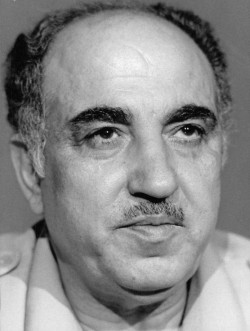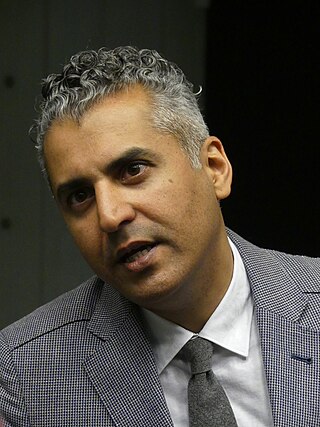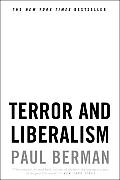The Abu Nidal Organization, officially Fatah – Revolutionary Council, was a Palestinian militant group founded by Abu Nidal in 1974. It broke away from Fatah, a faction within the Palestine Liberation Organization, following the emergence of a rift between Abu Nidal and Yasser Arafat. The ANO was designated as a terrorist organization by Israel, the United States, the United Kingdom, Canada, the European Union. and Japan. However, a number of Arab countries supported the group's activities; it was backed by Iraq from 1974 to 1983, by Syria from 1983 to 1987, and by Libya from 1987 to 1997. It briefly cooperated with Egypt from 1997 to 1998, but ultimately returned to Iraq in December 1998, where it continued to have the state's backing until Abu Nidal's death in August 2002.
Islamism is a religio-political ideology. The advocates of Islamism, also known as "al-Islamiyyun", are dedicated to realizing their ideological interpretation of Islam within the context of the state or society. The majority of them are affiliated with Islamic institutions or social mobilization movements, often designated as "al-harakat al-Islamiyyah." Islamists emphasize the implementation of sharia, pan-Islamic political unity, the creation of Islamic states,, and rejection of non-Muslim influences—particularly Western or universal economic, military, political, social, or cultural.

The Palestine Liberation Organization is a Palestinian nationalist coalition that is internationally recognized as the official representative of the Palestinian people. Founded in 1964, it initially sought to establish an Arab state over the entire territory of the former Mandatory Palestine, advocating the elimination of the State of Israel. However, in 1993, the PLO recognized Israeli sovereignty with the Oslo I Accord, and now only seeks Arab statehood in the Palestinian territories that have been militarily occupied by Israel since the 1967 Arab–Israeli War.

Yasser Arafat, also popularly known by his kunya Abu Ammar, was a Palestinian political leader. He was chairman of the Palestine Liberation Organization (PLO) from 1969 to 2004 and president of the Palestinian National Authority (PNA) from 1994 to 2004. Ideologically an Arab nationalist and a socialist, Arafat was a founding member of the Fatah political party, which he led from 1959 until 2004.

George Habash, also known by his laqab "Al-Hakim", was a Palestinian politician and physician who founded the Marxist–Leninist Popular Front for the Liberation of Palestine (PFLP).
Qutbism is an exonym that refers to the beliefs and ideology of Sayyid Qutb, a leading Islamist revolutionary of the Muslim Brotherhood who was executed by the Egyptian government in 1966. Influenced by the doctrines of earlier Islamists like Hasan al-Banna and Maududi, Qutbism advocates armed Jihad to establish Islamic government, in addition to promoting offensive Jihad.

Hegemony or Survival: America's Quest for Global Dominance is a book about the United States and its foreign policy written by American political activist and linguist Noam Chomsky. It was first published in the United States in November 2003 by Metropolitan Books and then in the United Kingdom by Penguin Books. It was republished by Haymarket Books in January 2024.

Salah Mesbah Khalaf, also known as Abu Iyad, was deputy chief and head of intelligence for the Palestine Liberation Organization and the second most senior official of Fatah after Yasser Arafat.

By Way of Deception: The Making and Unmaking of a Mossad Officer is a nonfiction book by a former katsa in the Mossad, Victor Ostrovsky, and Canadian journalist and author Claire Hoy.
Paul Lawrence Berman is an American writer on politics and literature.

Gilbert Achcar is a Lebanese socialist academic and writer. He is a Professor of Development Studies and International Relations at the School of Oriental and African Studies of the University of London.

Michael Alan Weiner, known by his professional name Michael Savage, is an American right-wing author, political commentator, activist, and former radio host. Savage is best known as the host of The Savage Nation, a nationally syndicated talk show that aired on Talk Radio Network across the United States until 2021, and in 2009 was the second most listened-to radio talk show in the country with an audience of over 20 million listeners on 400 stations across the United States. From October 23, 2012, to January 1, 2021, Michael Savage had been syndicated by Cumulus Media and Westwood One. He holds master's degrees from the University of Hawaii in medical botany and medical anthropology, and a Ph.D. from the University of California, Berkeley in nutritional ethnomedicine. As Michael Weiner, he has written books on nutrition, herbal medicine, and homeopathy; as Michael Savage, he has written several political books that have reached The New York Times Best Seller list.

Maajid Usman Nawaz is a British activist and former radio presenter. He was the founding chairman of the think tank Quilliam. Until January 2022, he was the host of an LBC radio show on Saturdays and Sundays. Born in Southend-on-Sea, Essex, to a British Pakistani family, Nawaz is a former member of the Islamist group Hizb ut-Tahrir. His membership led to his December 2001 arrest in Egypt, where he remained imprisoned until 2006. While there, he read books about human rights and made contact with Amnesty International who adopted him as a prisoner of conscience. He left Hizb-ut-Tahrir in 2007, renounced his Islamist past, and called for a secular Islam. Later, Nawaz co-founded Quilliam with former Islamists, including Ed Husain.
Muslim supporters of Israel refers to both Muslims and cultural Muslims who support the right to self-determination of the Jewish people and the likewise existence of a Jewish homeland in the Southern Levant, traditionally known as the Land of Israel and corresponding to the modern polity known as the State of Israel. Muslim supporters of the Israeli state are widely considered to be a rare phenomenon in light of the ongoing Israeli–Palestinian conflict and the larger Arab–Israeli conflict. Within the Muslim world, the legitimacy of the State of Israel has been challenged since its inception, and support for Israel's right to exist is a minority orientation. Pro-Israel Muslims have faced opposition from both moderate Muslims and Islamists.

Virtually Normal: An Argument About Homosexuality is a book about the politics of homosexuality by the political commentator Andrew Sullivan, in which the author criticizes four different perspectives on gay rights in American society, which he calls the "Prohibitionist", "Liberationist", "Conservative", and "Liberal" views, seeking to expose internal inconsistencies within each of them. He also criticizes the philosopher Michel Foucault and gay rights activists he considers influenced by Foucault, and argues in favor of same-sex marriage and an end to the don't ask, don't tell policy, which banned service by openly gay people in the US military. However, he makes a case against legislation aimed at preventing private discrimination against gay people.

Terror and Liberalism is a non-fiction book by American political philosopher and writer Paul Berman. He published the work through W. W. Norton & Company in April 2003. Berman asserts that modern Islamist groups such as al Qaeda share fundamental ideological elements with fascism and other 20th-century Western totalitarian movements, and he defends an assertive approach to root out this extremist thinking across the world. He details the appeal of violent terror, going back to Albert Camus' work The Rebel, first published in 1951. Berman hypothesizes that the spread of democracy in the Arab world, while highly difficult and involving a long struggle, is a fundamentally just cause, and he writes in support of the George W. Bush administration's foreign policies while also faulting President Bush for credibility problems and incompetence.

Dr. Robert G. Rabil is Professor of Political Science at Florida Atlantic University. He holds a master's degree in Government from Harvard University, a PhD in Near Eastern and Judaic Studies from Brandeis University, and an honorary PhD in humanities from the Massachusetts College of Liberal Arts. His area of studies and expertise include Political Islam, Salafism, Transnational and Revivalist Movements, Terrorism, US-Arab Relations, Arab-Israeli Conflict, US-Muslim Relations, and Contemporary Middle East Politics.

The Field of Fight: How We Can Win the Global War Against Radical Islam and its Allies is a book on United States national security strategy coauthored by Michael T. Flynn and Michael Ledeen. Published by Macmillan's imprint St. Martin's Press in 2016, it argues that the United States is engaged in a religious world war against what the authors call "Radical Islam"—defined as a violent "tribal cult" emanating from a "failed civilization"—but has so far been hampered in its response by political correctness. The authors claim that the United States and its allies face "an international alliance of evil countries and movements that is working to destroy us" and advocate a combination of increased military action and ideological warfare in response. They identify a range of enemies of which Iran is the foremost, and advocate a strategy of regime change aimed at overthrowing the Iranian government as a key step towards defeating "Radical Islam".

Defeating ISIS: Who They Are, How They Fight, What They Believe is a non-fiction book about counterterrorism against ISIS. It was written by Malcolm Nance, a former cryptology analyst, with a foreword by Richard Engel. Its thesis is that ISIS is not part of Islam, instead, it functions as a separate destructive extremist group. He emphasizes the fact that the majority of those who have been harmed by ISIS are themselves Muslim. The book traces the history of the movement back to the history of Al-Qaeda in Iraq, and it also discusses ISIS's combat style and recruiting tactics. Nance offers a four-point plan to defeat ISIS, including airpower and special forces, Internet tactics, strengthening the Syrian military, and engaging Arab world states.
The Battle of Tripoli was a major battle during the middle of the Lebanese Civil War in late 1983. It took place in the northern coastal city of Tripoli between pro-Syrian Palestinian militant factions and the Palestine Liberation Organization (PLO) led by Yassir Arafat. It resulted in the withdrawal of PLO and mostly ended their involvement in the war.














